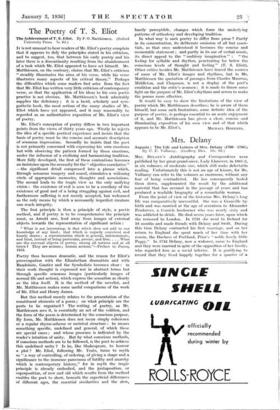The Poetry of T. S. Eliot IT is not unusual
to hear readers of Mr. Eliot's poetry complain that it appears to defy the principles stated in his criticism,
and to suggest, too, that between his early poetry, and his later there is a discontinuity resulting from the abandonment Of a task which Mr. Eliot appeared to have set himself. Mr. Matthiessen, on the contrary, claims that Mr. Eliot's criticism "steadily illuminates the aims of his verse, while his verse illustrates many aspects of his critical theory." Perhaps the difficulties which some readers find arise from the fact that Mr. Eliot has written very little criticism of contemporary verse, so that the application of his ideas to his own poetic practice is not obvious. Mr. Matthiessen's book admirably supplies the deficiency ; it is a lucid, scholarly and sym- pathetic book, the most serious of the many studies of Mr. Eliot which have yet appeared, and it may reasonably be regarded as an authoritative exposition of Mr. Eliot's view of poetry.
Mr. Eliot's conception of poetry differs in two important points from the views of thirty years ago. 'Firstly he rejects the idea of a specific poetical experience and insists that the basis of poetry must be the concise and accurate description of sensuous impressions. Secondly he insists that the poet is not primarily concerned with expressing his own emotions but with observing the pattern formed by those emotions, under the influence of a civilising and harmonising tradition. More fully developed, the first of these contentions becomes an insistence upon the necessity for the" objective correlative" —the significant detail compressed into a phrase which, through sensuous imagery and sound, stimulates a widening circle of appropriate memories, thoughts and associations.
The second leads to the tragic view as the only unifying vision : the existence of evil is seen to be a corollary of the existence of good and of a being struggling against evil, and furthermore suffering is not merely accepted, but welcomed as the only means by which a necessarily imperfect creature can reach integrity.
The first principle is thus a principle of style, a poetic method, and if poetry is to be comprehensive the principle must, as Arnold saw, lead away from images of external objects towards the representation of significant action :
"What is not interesting, is that which does not add to our knowledge of any kind ; that which is vaguely conceived and loosely drawn ; a representation which is general, indeterminate, and faint, instead of being particular, precise, and firm.. . . What aro the external objects of poetry, among all nations and at all times They are actions ; human actions."—Preface to Poems, 1853.
Poetry thus becomes dramatic, and the reason for Eliot's preoccupation with the Elizabethan dramatists and with Baudelaire, Gautier and the Symbolists becomes clear : in their work thought is expressed not in abstract terms but through specific sensuous images (particularly images of normal life and action), which express the sensation as clearly as the idea itself. It is the method of the novelist, and Mr. Matthiessen makes some useful comparisons of the work of Mr. Eliot and Henry James.
But this method merely relates to the presentation of the constituent elements of a poem ; on what principle are the parts to be organised ? The writing of poetry, as Mr. Matthiessen sees it, is essentially an act of the volition, and the form of the poem is determined by the conscious purpose.
By form, Mr. Matthiessen does not mean simply coherence or a regular rhyme-scheme or metrical structure : he means something specific, undefined and general, of which these are special cases ; and whose presence is indicated by the reader's intuition of unity. But by what conscious methods, if conscious methods are to be followed, is the poet to achieve this undefined unity ? Is he, like Shakespeare, to borrow a plot ? Mr. Eliot, following Mr. Yeats, turns to myth as "a way of controlling, of ordering, of giving a shape and a significance to the immense panorama of futility and anarchy which is contemporary history," for in myth the tragic principle is already embodied, and the juxtaposition, or superposition, of new and old which results from the method enables the poet to show, beneath the superficial differences of different ages, the essential similarities and the slow, barely perceptible, changes which form the underlying patterns of orthodoxy and developing tradition.
In what way is such poetry to differ from prose ? Partly in its concentration, its deliberate omission of all but essen- tials, so that once understood it becomes the concise and memorable statement ; and partly in its use of verbal music, its direct appeal to the "auditory imagination" : "the feeling for syllable and rhythm, penetrating far below the conscious levels of thought and feeling" (T. S. Eliot). Other critics besides Mr. Matthiessen have traced the sources of some of Mr. Eliot's images and rhythms, but in Mr. Matthiessen the quotation of passages from Charles Maurras, Middleton, and Chapman, is not a display of the poet's erudition and the critic's acumen ; it is made to throw some light on the purpose of Mr. Eliot's rhythms and serves to make the poems more effective.
It would be easy to show the limitations of the view of poetry which Mr. Matthieseen describes ; he is aware of them himself, but some such limitations, some definite idea of the purpose of poetry, is perhaps essential to an acute enjoyment of it, and Mr. Matthiessen has given a clear, concise and illuminating exposition of his own view and of that which










































 Previous page
Previous page